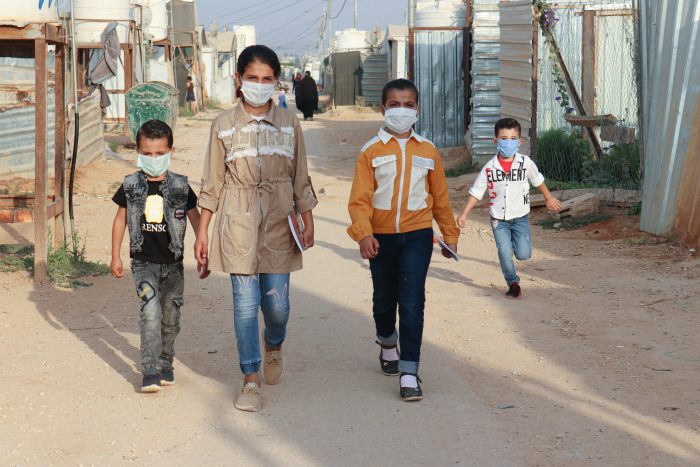Discussion: Pressures from a pandemic
The panel discussion was moderated by Elizabeth Ferris, WRMC Vice President of Research, with introductory and closing remarks provided by WRMC Honorary Chair, HRH Prince El Hassan bin Talal of Jordan. The discussants were report authors: Omar Asfour, a medical doctor and a public health researcher and practitioner, Oroub El-Abed, senior researcher and co-investigator at the Centre for Lebanese Studies in Amman, Jordan, and Dr. Rasha Istaiteyeh, Associate Professor of Economics, The Hashemite University in Zarqa, Jordan.

“Refugees, as some of the most vulnerable members of society, remain disproportionately affected by so many factors, and most evidently at the moment, the pandemic itself.”
– HRH Prince El Hassan bin Talal discussing the regional refugee response during COVID-19
The discussion began with Dr. Rasha Istaiteyeh, author of The Economic Impact of COVID-19 on Syrian Refugees in Jordan, discussing the economic impacts of the pandemic on Jordan and its consequences for Syrian refugees hosted there. Dr. Istaiteyeh noted that the health ministry of Jordan successfully enacted precautionary health procedures by locking down the country to stop the spread of the virus since the beginning of the pandemic. However, during the time of health success, the economic impact on the country was significant, largely due to the lack of an industrial sector as 70% of the GDP is based in the disproportionately impacted service sector.
As a knock-on effect, public revenues have decreased substantially, and unemployment has increased considerably, expanding the need for international assistance to help Jordan support Syrian refugees within its borders. Yet, what is now occurring is a drop in financial assistance, with a reported shortfall of over 80% in the next iteration of Jordan’s response plan for Syrian refugees.
Consequently, the economic prospects for Syrian refugees in Jordan will not improve during the pandemic for two reasons: first, the possibility of contracting the disease, which has now spread to refugee camps, and second, due to high unemployment in Jordan, Syrian refugees are less likely to receive already limited work permits and are relegated to temporary work agreements in the informal sector.

“[The lack of access to services in Jordan] has caused an alarming increase in [Syrian refugee] livelihood risks since the majority of the refugees depend on their daily income.”
– Oroub El-Abed on refugee livelihoods in Jordan during the pandemic
The discussion then turned to how the pandemic has impacted Syrian refugees in Jordan at the local level, with Oroub El-Abed, co-author of Impact of COVID-19 on Syrian Refugees in Jordan from the Refugee Perspective, noting that the main concerns for Syrian refugees in Jordan since 2012 have been to provide safety and security for their families and to find the means to sustain themselves now and into the future.
Up until the pandemic, the Jordanian response plan had assisted Syrian refugees by providing cash assistance and access to services and helping them secure basic rights in the country. However, because of the pandemic and subsequent lockdown, Syrian refugees in Jordan have been unable to access many assistance programs as the Jordanian government has prioritised its own citizens at the expense of the refugees it hosts. As most refugees depend on their daily income from informal sector employment, their livelihoods are now at risk. Many Syrian refugees have had to work together, combining human, financial, and social assets to make ends meet. Yet, the challenges are mounting, as refugees face serious obstacles insecuring basic income to provide for their families, pay rent, or purchase much needed educational tools to support their children.

“The majority of [Syrian] refugees in Jordan are really reluctant to return now due to uncertainties beyond the border.”
– Omar Asfour discussing COVID-19, and the economic and security situation in Syria
Next, Omar Asfour, co-author of Between Two Outbreaks: Syrian Refugees and the Consequences of COVID-19 in Syria and Jordan, described how many years of deliberate targeting of health care services during the Syrian conflict led to a decimation of the country’s health care capacity even before the pandemic’s onset. The health systems that do still exist and operate in Syria are fragmented with little coordination between areas under government and opposition control. Although data are lacking, it is likely that parts of the country are experiencing high transmission rates without the resources needed to combat the spread of the virus.
As a result of the current health, and ongoing political and economic crises in Syria, the incentives for Syrian refugees in Jordan to return to their home country have greatly diminished. Consequently, many Syrian refugees are now in the position where they lack access to economic opportunities in Jordan where they are hosted, but face a situation back home that is even more dire than the one they find themselves in.

“For Jordan to exit such an [economic] crisis, it must take the opportunity to maximise the benefits of having Syrian refugees on its land… Jordan must upskill Syrian refugee skills.”
Dr. Rasha Istaiteyeh on the economic situation in Jordan, exacerbated by COVID-19
While the situation facing Syrian refugees in Jordan is dire, there may be an opportunity to maximise the benefits of having Syrian refugees by working in a mutually beneficial way. Jordan can work to upskill Syrian refugees to work in the agricultural sector where labor is needed. With the assistance of the international community to improve the Jordanian agricultural sector through agricultural technology, Syrian refugees can learn new trades, become gainfully employed, earning incomes, and assisting in the re-growth of the Jordanian economy. Likewise, Jordan can employ Syrian refugees in the construction sector – another area where labour is needed. While these are short-term solutions, much more work is needed to secure the long-term future of Syrian refugees.
Key findings from the reports include:
- There are over 650K registered Syrian refugees in Jordan. That number doubles to around 1.3M when taking into account those who are not registered.
- In one of the studies, interviews were conducted with 35 Syrian refugees distributed across Jordan, including 18 males and 17 females across Mafraq, Irbid, Amman, Zarqa’a and Ma’an governorates, as well as Azraq, Emirati and Za’atari camps.
- A stagnated Jordanian economy with a near 20% unemployment rate (particularly among youth), and a fluctuating GDP is having reverberating impacts on deteriorating economies in surrounding countries with large populations of refugees and internally displaced persons such as Iraq, Lebanon, and Syria.
- The Jordanian government’s swift and strict COVID-19 response effort was largely successful in preventing the spread of the virus but has led to a national deficit of around US$4.5 billion, with long-term implications on livelihoods, particularly for Syrian refugee populations (of whom approximately 80% live under the poverty line).
- Economic sectors where Syrian refugees overwhelmingly find employment including tourism, construction, trade and customer service, have been significantly impacted by the pandemic.
- For most Syrian refugees across Jordan, access to online education has also been challenging throughout the pandemic. Several interviewees reported not being able to recharge their mobile phone credits in order to access the internet for their children’s classes or exams. One interviewee expressed having to have had “to borrow the money to buy the mobile phone” to continue their education.
The World Refugee & Migration Council thanks the International Development Research Centre for their support of The Impact of COVID-19 on Syrian Refugees in Jordan research project. This conference was made possible through a partnership with Cuso International.
To watch a recording of the webinar “Challenges Facing Syrian Refugees and Jordan: Pressures from a pandemic” click here.
Download and read all of the research papers at the links below:
WRMC Research Papers on the Impact of COVID-19 on Syrian Refugees in Jordan:
- Summary Report — Challenges Facing Syrian Refugees and Jordan: Pressures from a Pandemic (PDF)
- Summary Report — Arabic Version (PDF)
- The Economic Impact of COVID-19 on Syrian Refugees in Jordan (PDF) — Rasha Istaiteyeh
- Impact of COVID-19 on Syrian Refugees in Jordan from the Refugee Perspective (PDF) — Oroub El-Abed and Nuseibah Shabaitah
- Between Two Outbreaks: Syrian Refugees and the Consequences of COVID-19 in Syria and Jordan (PDF) — Omar Asfour and Hosam Allaham
Feature Image Credit: UNHCR/Shawkat Alharfosh
